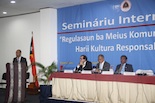“Regulation of the Media – Towards a Culture of Responsability”, a three-day debate

The Government of Timor-Leste, more precisely the Secretariat of State for the Media (SoSM), in a joint-organization with the European Union Media Program, has started an international seminar which will gather national as well as international speakers in Díli, the speeches of whom will focus on the following topic: “Regulation of the Media – Towards a Culture of Responsability”.
On this first day, 20 of March, the opening session counted on the speeches of the Secretary of State for the Media, Nélio Isaac Sarmento, of the Vice Prime Minister, Fernando La Sama de Araújo, and of the Political Adviser of the Portuguese Embassy representing his Ambassador, Pedro Severo de Almeida.
In his speech, Nélio Isaac Sarmento showed that SoSM represents the will of the Government in regulating the profession of the journalists and the Media, reminding that the Constitution of the Democratic Republic of Timor-Leste provides for the right to information, which implies freedom of expression and of information.
According to the Secretary of State, “the Law of the Media not only protects and defends the journalists, but it also demands added professionalism, quality and accountability in accordance with an ethics that reflects a national identity and culture and promotes transparency and accountability”.
The Secretary of State also stated that “the Government continues to encourage the Media to conduct its work in such a manner as to always remain independent from the political and the economic powers”.
The second speaker in the seminar was Fernando La Sama de Araújo who started by stating that “democracy is a regulated freedom which implies compliance with the laws”. He stressed the efforts being made by the Government in professionalizing the various professional careers so that media operators can work with professionalism. For the Vice Prime Minister, “the power of the media should be used by the journalists in a wise and fair manner”.
Pedro Severo de Almeida considers that “the Timorese media is undoubtedly an irreplaceable pillar in the construction in the free, democratic and peaceful country that Timor-Leste managed to transform itself after almost 11 years after the restoration of its independence”. At the same time, he recalled that “In the 2013 edition of the Press Freedom Index of the Reporters Without Borders, Timor-Leste had the best result in the South East Asian Region and one of the bests in Asia”. In addition to underlining the importance of strictness and truth to be observed by media professionals, Pedro Severo de Almeida also stressed the will of Portugal in continuing to support the training and capacity building of Timorese journalists.
After the opening ceremony, the first session came to us through the President of the National Parliament, Vicente Guterres, on the topic “Freedom of Press, Freedom of Speech, and the Right to Information in the context of the Constitution of the Democratic Republic of Timor-Leste”.
In an eloquent speech, Vicente Guterres refers to the Constitution of the Republic in which article 40 has to do with freedom of speech and information and article 41 deals with freedom of press and of the media, and reminds that “these freedoms cannot be exercised without respect for the other rights or interests also provided for in the Constitution”.
The President of the National Parliament further states that “in order to accomplish its role, the press needs to be free from political, economic, financial, military and religious interferences”.
Banbang Harimurty, Vice-President of the Indonesian Press Council, spoke on the “Defence of Freedom of Press and Regulation of the Media”, thereby concluding the first session.
Carmelita Caetano Moniz, President of the Commission of Constitutional Affairs of the National Parliament spoke on “A Law for the Media”, after which several interventions by diverse media bodies took place.
The first day of this international seminar on “Regulation of the Media – Towards a Culture of Responsability” was characterized by a major affluence and participation in the debates by all in attendance, which included students and a considerable number of media professionals, both national and international.










































